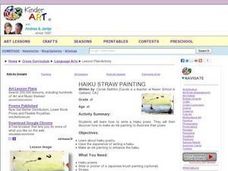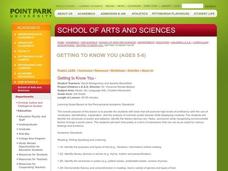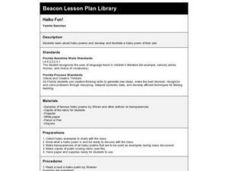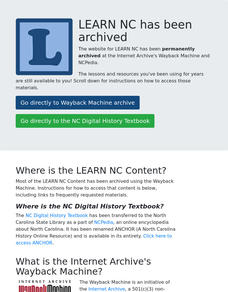Curated OER
The Numbers in Nonfiction
This library media PowerPoint introduces the system of nonfiction call numbers. Each slide includes information on what numbers go with each subject, along with colorful illustrations.
Teach Your Children Well
Spinning a Web
Lisa Trumbauer's big book, Spinning a Web, provides kids with an opportunity to practice word sequencing, to use correct punctuation, and to develop comprehension skills with a cloze reading evercise.
Curated OER
Deerfield Families
To understand the consequences of the 1704 attack on Deerfield by combined French and Native American forces, groups research primary and secondary resources related to four Deerfield families involved in the attack.
Curated OER
The Tabloid Ballad
Students explore the poetic ballad. They examine the rhythm of a typical ballad and listen to recitations of sample ballads. They choose an article from a supermarket tabloid and write a comical ballad using rhythms and structures...
Curated OER
Mother's Day
Third graders write a poem describing why they love a special family member. They use decorative paper and illustrations for their poems. Students give thanks and praise to their family members.
Curated OER
Biopoem: Ender's Game
Here's an activity designed to encourage character analysis. Readers craft a biopoem for a character in Orson Scott Cards' popular science fiction novel Ender's Game.
Curated OER
Haiku Straw Painting
Students explore haiku poetry, have the experience of writing a haiku, and make an ink painting to enhance the haiku.
Curated OER
How Animals Bond
In this animals lesson plan, students students write a description about a pet or animal that they know. They include details that would help someone who has never met their animal feel like they know it already. Artwork about their...
Curated OER
Could You Repeat That?
High schoolers participate in an oral story telling activity designed to show how story embellishments occur. They read "Beowulf" and identify incongruities that suggest additions and embellishments over the years.
Curated OER
Bio-Poem
Middle schoolers explore parts of speech that relate to their personality characteristics. They examine parts of speech online, and compose a bio-poem that combines the parts of speech with a biography.
Curated OER
What's In a Name?
Students research Cabeza de Vaca and other conquistadors. They review how names were given to Alvar Nunez Cabeza de Vaca's family and discuss the achievements, risks, experiences, and characteristics of de Vaca. They write an acrostic...
Curated OER
Identifying Social, Cultural, and Historical Perspectives That Changed the World
Students complete a graphic organizer as they watch a video about the roles of dogs in society. In this social and cultural perspectives of dogs lesson, students view a video and sort information into a graphic organizer. ...
Curated OER
Figurative Language
Students put poetic interpretations back together to explain the poem. Starting with cliches, students learn what various phrases mean. They analyze words, phrases and levels of meaning.
Curated OER
Are You Money Smart?
Learners figure out and discuss the irony of this coin-centric poem. They also practice persuasive letter writing, and identify and count coin/money values.
Curated OER
Geo Jammin'
Middle schoolers compare and contrast related two- and three-dimensional shapes, and complete a Venn diagram illustrating the attributes of each. Using a poem pattern from another lesson, students use data from the diagram to write an...
Curated OER
Getting to Know You
Third graders explore different types of poetry and illustrate their own experiences through creating their own poem. In this getting to know you lesson plan, 3rd graders create and recite their poems with a self-portrait.
Curated OER
Two Haiku
Eighth graders, in pairs, discuss what they already know about Haiku poetry. They try to remember the rules, history, and focus of traditional Japanese Haiku. they read more examples of Haiku and then write and illustrate their own...
Curated OER
Wish You Were Here! - Collaborative Literacy Project
Students explore videos, software and print resources to investigate the concept of community. Students write poems about their town and illustrate them for a collaborative literacy project.
Curated OER
Norse Mythology
Third graders read several selections of Norse mythology and compare this mythology to others studied in the past. They are introduced to runes. They read poetry and compile a class book of favorite poems. They define idioms and cite...
Curated OER
I Can Be Happy for Hours Just Doing
Young scholars explore leisure activities. In this leisure activities lesson, students define the topic and write a paper about a leisure activity they love. Young scholars draw a cartoon illustrating the activity and write a poem or...
Curated OER
Going Batty - Part II
First graders apply the knowledge they've gained about bats to create bat poetry.
Curated OER
A Little Alliteration
In this poetry lesson plan, students listen to stories that contain alliteration. While listening to stories, student pairs make a list of words that they then use to construct "silly sentences" that contain alliteration. Each student...

























